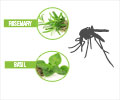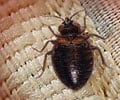- Mosquito bites not only irritate but also spread lethal viral infections
- To overcome that, scientists are making mosquitoes repel away from human skin
- One among them is, altering their way of expressing odor receptors.
How do insect repellents work?
Insect repellents are pesticides that are used to prevent, destroy, repel, or reduce the effect of any pest. Insect repellents work based on the mechanism of mosquitoes that rely on their sense of smell to locate human skin.Read More..
But sometimes mosquitoes escape from interacting with insect repellents. Knowing how this happens can lead to developing new and effective ways of avoiding mosquito bites.
New sensing experiment
In previous studies it was seen that mosquitoes’ smell sensing cells stop working when they are forced to produce extra receptors on the surface of the cell. Whereas in fruit flies, when new odor sensors are produced, they fly away from a certain smell.This difference made researchers suspect whether mosquitoes have the same reaction as fruit flies when new odor sensors are given.
“When experiments don’t go as predicted, there’s often something new to be discovered,” says Christopher Potter, PhD, associate professor of neuroscience at the Johns Hopkins University School of Medicine.
First, researchers tested if female Anopheles mosquitoes, which transmit parasites that cause malaria in humans could push odor sensing cells into a similar expression to fruit flies when triggered by smell released from insect repellents applied on the skin.
Later, researchers did additional experiments to find whether changes in gene level could make this work. They found that mosquitoes that had some genetic modification, had 95% fewer changes in their natural smell receptors compared with unmodified mosquitoes.
Since smell sensing systems continue to develop into adulthood of mosquitoes eight days after hatching, they might be ready to adapt to changes in their smell sensors based on their surrounding environment.
Using this type of compliance in a mosquito’s smell sensing cells may allow the mosquito to adapt to its odor environment. Researchers are conducting experiments to test this theory.
They also hope that the current findings may be helpful to invent methods that can trick the mosquitoes not preferring the smell of humans.
References:
- Maguire, S. E., Afifi, A., Goff, L. A., & Potter, C. J. (2022). Odorant-receptor-mediated regulation of chemosensory gene expression in the malaria mosquito Anopheles gambiae. Cell Reports, 38(10), 110494. - (https://doi.org/10.1016/j.celrep.2022.110494)
Source-Medindia










